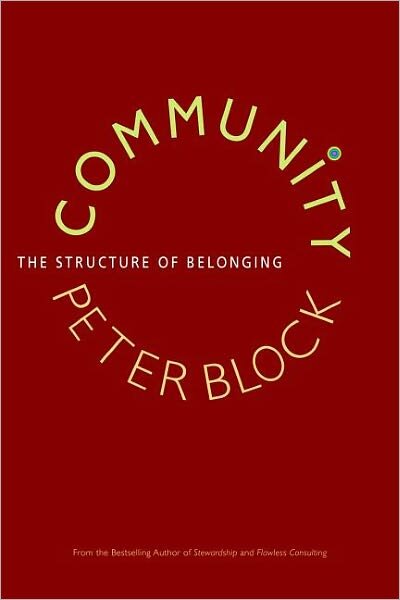Peter Block, Community: The Structure of Belonging. Berrett-Koehler Publishers, 2009.
Companion volume: Block, The Answer to How Is Yes
Referenced in: Strategies for Church Renewal – Whole Systems, Large Group
LifeandLeadership.com Summary
This book discusses Appreciative Inquiry (AI), a Whole Systems approach to organizational renewal that has been useful in many churches. Though not addressed to churches, many AI practitioners see his writings as a benchmark on the subject.
This text is best if used alongside Block’s companion volume, The Answer to How is Yes. In The Answer to How is Yes, Block lays out AI philosophy. In Community, Block describes the practice. The best way to read the book is to jump over to a six-page section at the end, “Book at a Glance,” which describes the context and main ideas, a summary of the questions used in appreciative inquiry, and a quick look at how to design the most suitable physical space. From there, it is easy to see how the chapters expand on each area.
The undergirding concern of appreciative inquiry is that most of us never connect meaningfully enough with others to truly understand or be understood, grace others with our greatest gifts or benefit from the gifts of others, and share our hopes for the future or be inspired by others’ visions. To counter this, we must move from isolation to connectedness and mutual care for the whole and shift our conversations from problems to possibilities. Out of this emerges a more hopeful future that captures the noblest aspirations and greatest gifts of all involved. Facilitating these conversations means leveraging the power of small groups that meet as part of a larger gathering (see also the materials on Large Group Facilitation). In these settings, we must move away from traditional conversations that seek to explain, study, analyze, advise, etc. We must move toward an environment of mutual engagement and curiosity through the use of questions. This does not mean just any questions, but precisely stated questions structured purposely around five aspects of belonging: possibility, ownership, dissent, commitment, and gifts (the book provides the questions for each of these aspects). It is also important to give careful attention to the physical space in which these discussions occur (the book gives specific guidelines).
Translated into churchese, many see this as a leadership philosophy that allows God’s lofty kingdom visions and the Spirit-led inclinations of the people to come to fruition through an empowering kind of social architecture. AI suggests a way the leader may help bring these inclinations to life in the congregation. This is distinct from other planning methods that are heavier on prescriptive analysis and guidance from a core of appointed leaders. In AI, the leader is not a giver of answers or an advocate of a particular direction who persuades and defends. Instead, the leader is the convener who focuses on the structure of how the congregation gathers for conversation and the context in which the gatherings take place. It is a very non-directive approach designed to create community discernment and ownership. Some leaders will love this, while others may prefer a more directive model.
Consult the Resource Guide for additional works on AI and other Whole Systems approaches.
From the Publisher
Modern society is plagued by fragmentation. The various sectors of our communities—businesses, schools, social service organizations, churches, government—do not work together. They exist in their own worlds. As do so many individual citizens, who long for connection but end up marginalized, their gifts overlooked, their potential contributions lost. This disconnection and detachment makes it hard if not impossible to envision a common future and work towards it together. We know what healthy communities look like—there are many success stories out there, and they’ve been described in detail. What Block provides in this inspiring new book is an exploration of the exact way community can emerge from fragmentation: How is community built? How does the transformation occur? What fundamental shifts are involved? He explores a way of thinking about our places that creates an opening for authentic communities to exist and details what each of us can do to make that happen.
About the Author
Peter Block is an author, consultant and speaker who helped initiate the interest in empowerment and whose work now centers on ways to bring service and accountability to organizations and communities.
He is the author of three best selling books: Flawless Consulting: A Guide to Getting Your Expertise Used, Second Edition (1999), The Empowered Manager: Positive Political Skills at Work (1987), and Stewardship: Choosing Service Over Self-Interest (1993). His most recent book, Flawless Consulting Fieldbook & Companion: A Guide to Understanding Your Expertise , was released in November 2000.
Block has joined with the Association for Quality and Participation to create The School for Managing & Leading Change. This unique program takes place over several months and is attended by teams from the public and private sector too learn how to redesign their workplace. (For information on the School, call 800-733-3310.)
Block is a partner in Designed Learning, a training company that offers consulting skills workshops. These workshops were designed by Block to build the skills outlined in his Flawless Consulting books.
He has received several national awards for outstanding contribution in the field of training and development. He serves on the Boards of Directors of the Association for Quality and Participation and Connecticut Public TV and Radio, and the Advisory Council for Zefer Corporation.
***For additional information on this resource, including reviews, click the bookstore links. Check the reference at page top or the links below for resource guides on related topics.***
See Resources on Over 100 Areas of Ministry Leadership:


